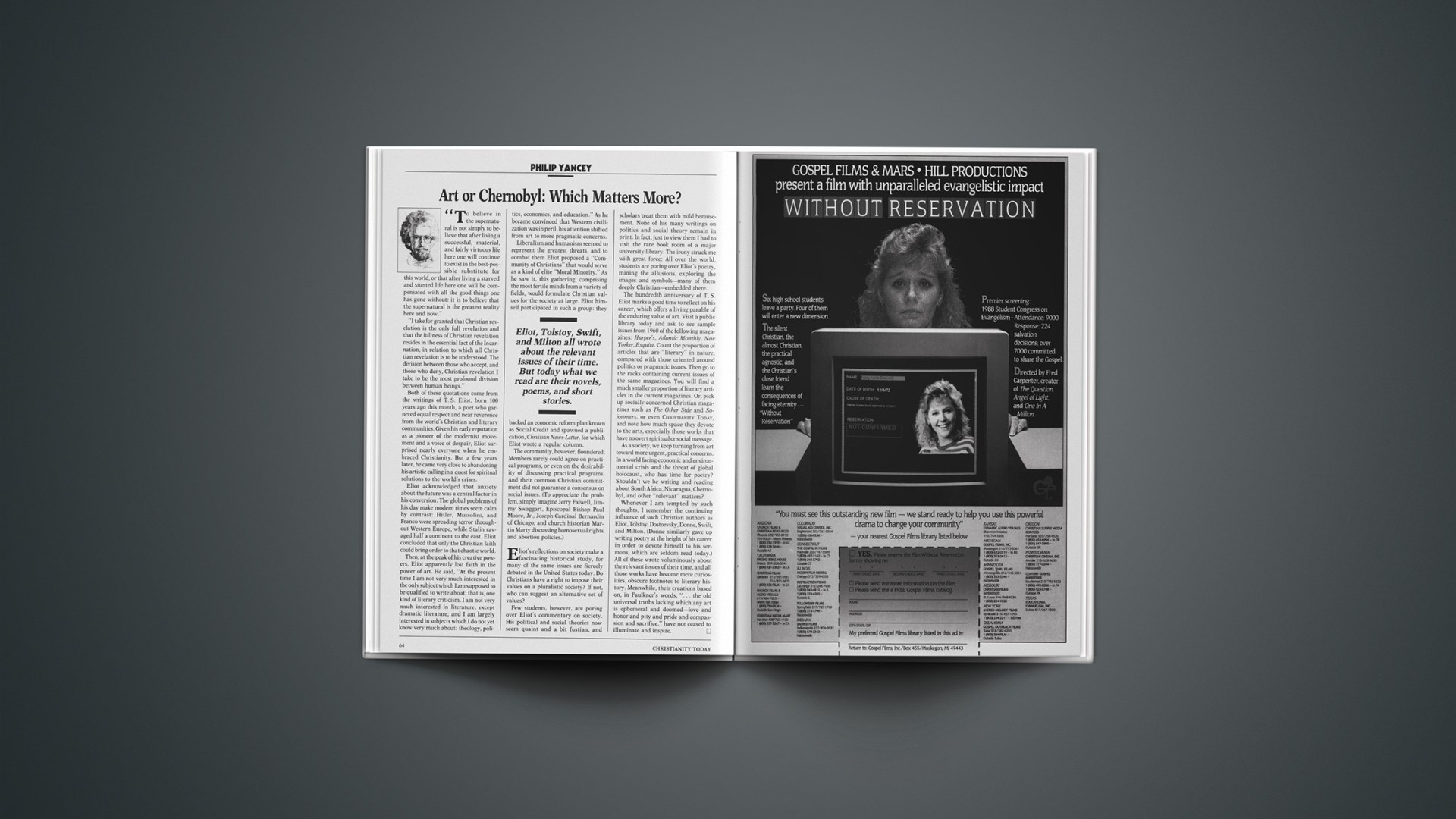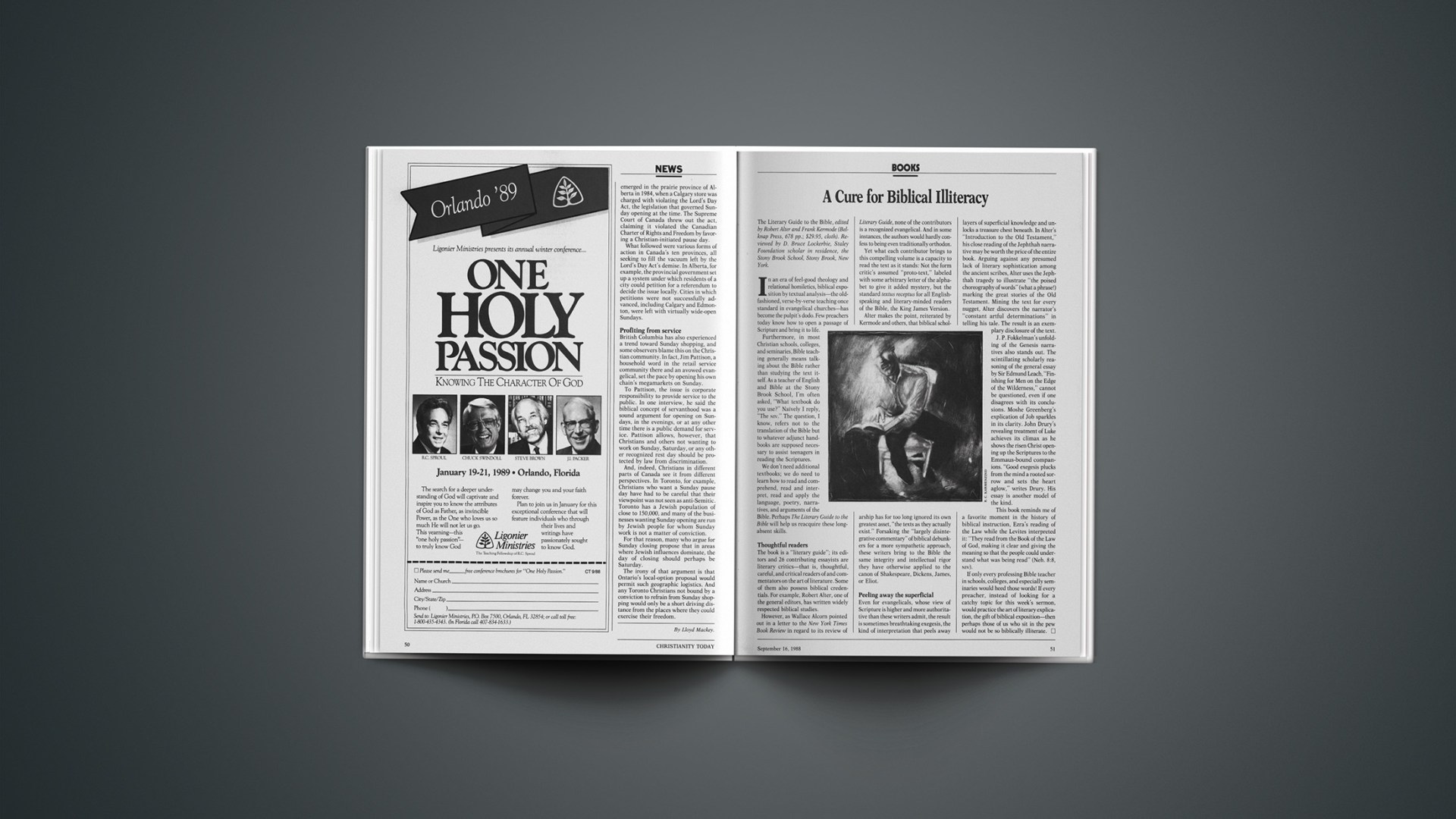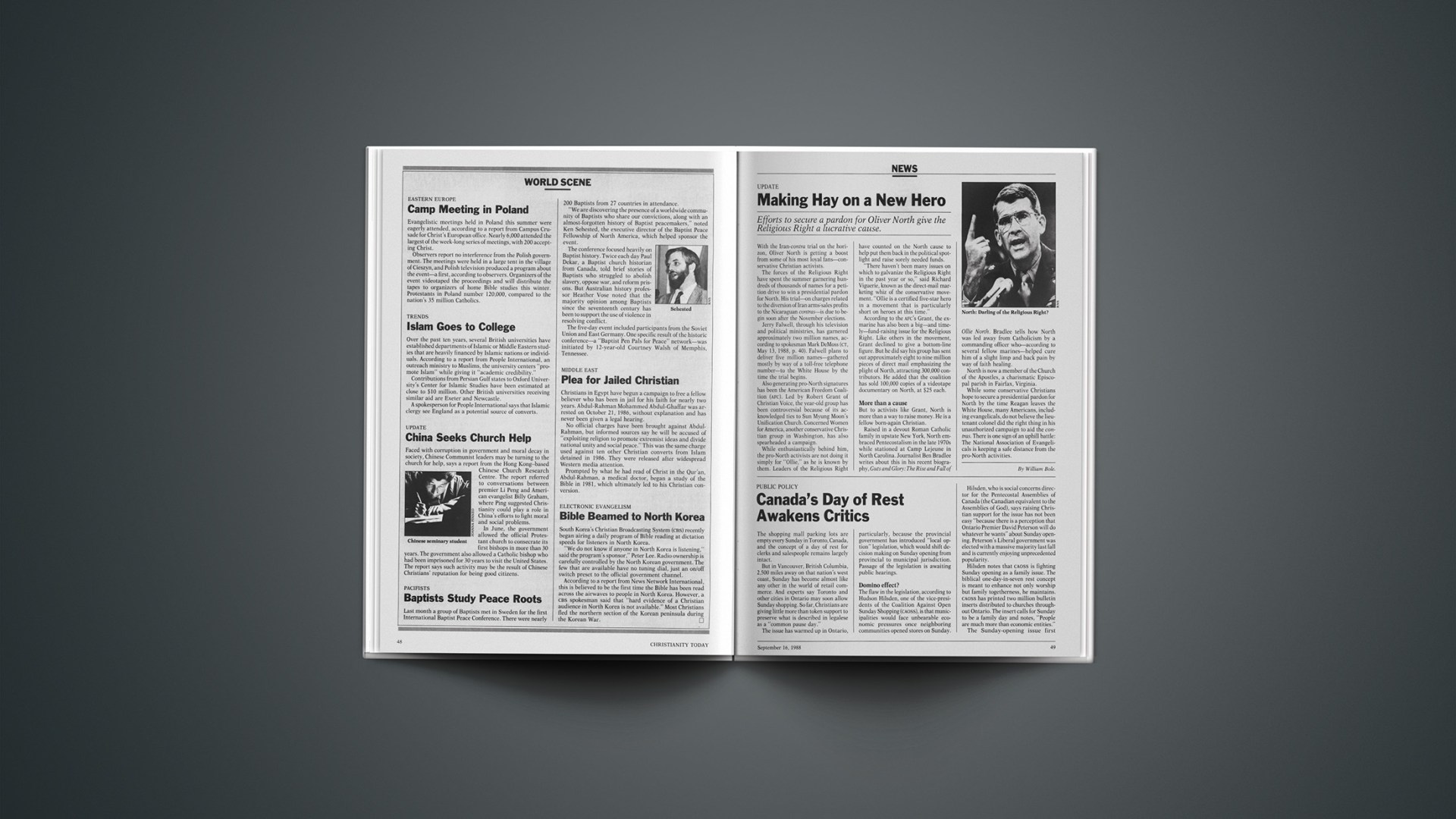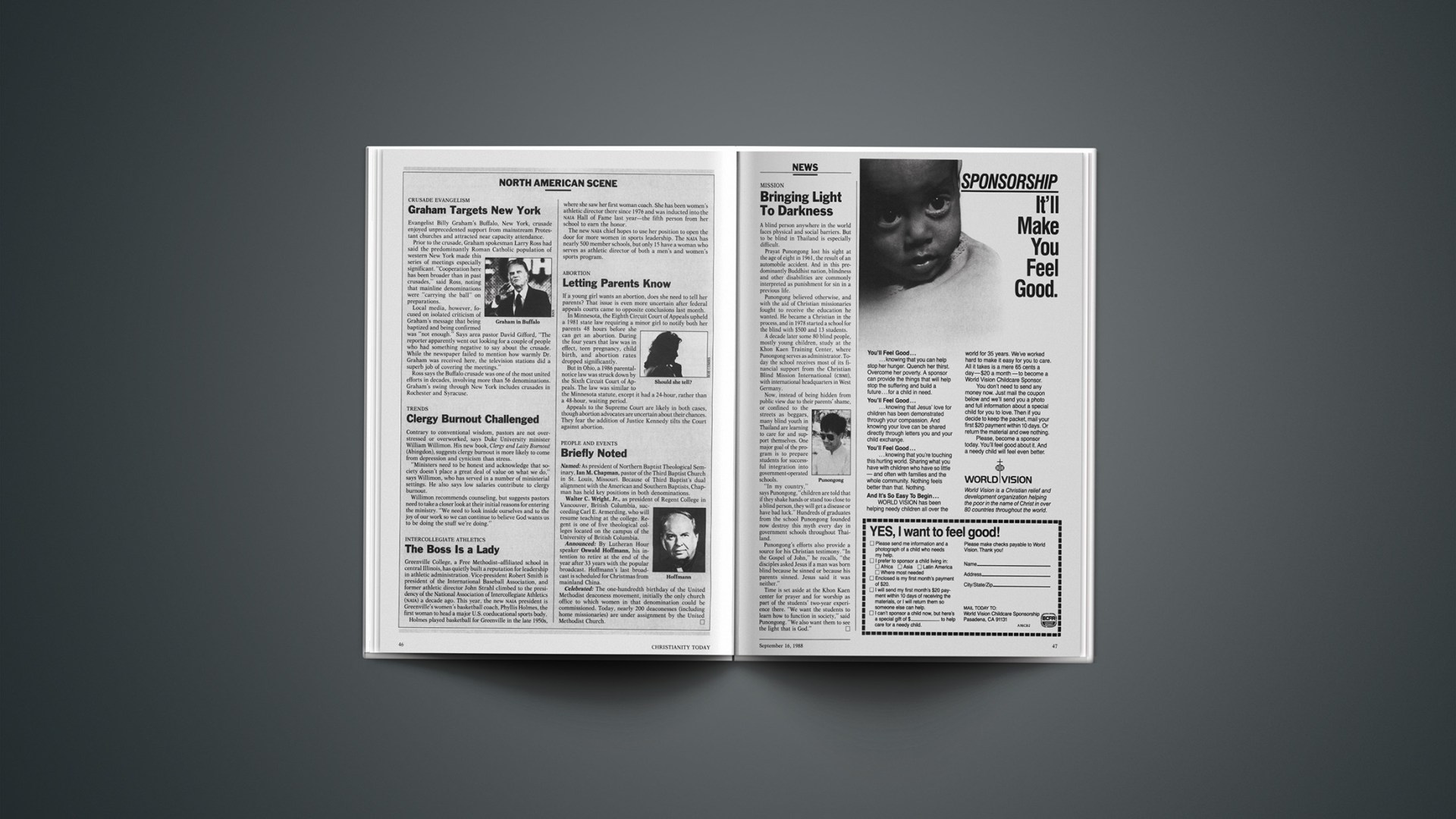Why People Do What They Do
Understanding People by Lawrence Crabb, Zondervan, $12.95
Reviewed by Mark Coppenger, pastor, First Baptist Church, El Dorado, Arkansas
In one of the Marx brothers’ movies, Groucho poses as a physician. A patient comes in, raises his arm, and says, “Doc, it hurts when I do this.”
Groucho immediately responds, “Then don’t do that. That’ll be ten dollars.”
Lawrence Crabb, in Understanding People, urges Christian counselors to go beyond this level of “Cut it out” and “Chin up.” He wants us to get to the whys of anorexia nervosa, depression, and homosexuality. He gives Freud some credit for taking us inside the human psyche, but he takes pains to distance himself from Freud, Rogers, and other secularists who ignore or defy the Bible.
This book attempts to show how the Bible provides the framework for tackling all but organically based psychological problems. While his best-selling book Inside Out presents his principles at the popular level, Crabb said in an interview that he sees this volume as his foundational and scholarly work.
Understanding People has three main divisions. The first is an essay in epistemology, the study of what we can know and how we can know it. Crabb shows why the maxim “All truth is God’s truth” can be treacherous: in putting general and special revelation side by side, we’re tempted to sell the Bible short when it conflicts with current wisdom.
The second division takes a hard look at how we tick, or fail to tick, in accordance with our Creator’s designs.
The third division is by far the smallest. It closes the book with a word on love, the fruit of all Crabb prescribes.
If the Bible is our source book, what does it say? It doesn’t address all our troubles directly; there’s nothing specific, for instance, on bulimia or the cause of drunkenness. Thus, the preacher who tracks through Bible books with pure exegesis is going to leave gaps precisely where a lot of folks are despairing.
Crabb’s answer is to move to the level of doctrinal categories, the subjects you’d find in the table of contents for a biblical theology text. He expresses his approach in this formula: “Biblical Categories x Life’s Observations x Reflection = Biblical Understanding.”
We know the doctrinal categories in that equation, but what about “Life’s Observations”? Crabb explains that it takes insight to realize, for example, that a man who exposes himself is gratified when his “audience” is shocked or horrified. As we reflect on such findings within a scriptural framework, we achieve the understanding we need to help him change.
Thus armed, we’re able to address such real-life questions as “How do I cope with the awful fact that my father was too weak ever to love me?” or “How do I stop worrying about money?”
Crabb argues that people have a deep longing for acceptance and impact. We’re thirsty. But in our natural state we’re also fools, and in our foolishness we determine to slake our thirst apart from God.
The means people use to slake life’s thirst are mostly broken cisterns. But as long as people keep moving from one to the other, they may not notice that none of them holds water. After all, they take a while to drain.
Eventually, however, shyness, bluster, shopping, pornography, sociability, etc. wears thin, and in that moment, people may well discover their need. Three agents of exposure stand ready to help: the Word of God, the Spirit of God, and the people of God. The work of soul searching and conviction gets underway, and as the poster says, “The truth shall make you free, but first it will make you miserable.”
If the hurting receive the truth, their illusion of independence gives way to a healthy sense of helplessness. And in Christ they find the love and significance for which they’ve thirsted. They then move from destructive to constructive emotions and find themselves on the road to maturity.
Thus, the Christian counselor has some preliminary work to do beneath the water line. He must probe for pain and the presence of defiance strategies. Once he exposes these, he’s in a position to show a more perfect way.
I could have wished for a clearer line between the character of the lost person and that of the regenerate. Are there two corresponding ways to counsel, or is the approach essentially the same for both? Crabb touched on these matters, but I came away wanting more.
When I asked Crabb for examples of his notions at work in a church setting, he mentioned the efforts of Kevin Huggins, former chaplain to Grace College and now associate pastor of The Chapel in Akron, Ohio. In an article he sent me, Huggins presents the case of a young woman to show how the acknowledgment of painful memories can bring life through a sharpened sense of dependency on God. Woefully mistreated as a child, “Lorraine” fashioned stories of her parents’ greatness, suppressed her pain at their lack of love for her, and suffered frequent nightmares about the future.
But as she frankly confronted her disappointments and abandoned her attempts to curry her parents’ favor, she was driven to rest in God. She began to heal as she left behind the broken cisterns of fantasizing and posturing.
Crabb’s insights have helped me, too. His strong focus on dependency has refreshed my ministry. It’s easy for me to slip into thinking that once I master the basic skills of the pastorate, I’ll be equipped to succeed. But the pastor who sees himself as a consummate professional rather than a desperately needy servant, standing before a uniquely sufficient God, has missed the essence of ministry. The realization of our total dependence on God must dawn daily on us all.
Unique Challenges of the Larger Church
The Senior Minister by Lyle Schaller, Abingdon, $10.95
Reviewed by Keith Meyer, pastor, Maple Grove Evangelical Free Church, Maple Grove, Minnesota
At some point in seminary, we all probably heard the advice concerning a new pastorate: “Don’t make any changes for at least a year. Get to know the people and their vision for the church.”
That’s good advice for pastoring a smaller church. After ten years of pastoring two large churches, however, I have found it to be bad advice for the senior minister of a big congregation. And since reading Lyle Schaller’s The Senior Minister, I am relieved to find I’m not alone in that opinion. Changes are often needed at a large church, and the people expect the new senior minister to initiate them, quickly.
Schaller writes from 28 years of consultations with ministers of multi-staff churches. This book is in the form of a story about Pastor and Mrs. Donald Johnson at First Church, a church that at one time had 500 in morning worship but has now declined to just under 200. He uses Don’s experiences and conversations with other staff members, laity, and other senior ministers to show us the lessons a senior minister will need to learn or, in many cases, unlearn.
The first lesson concerns that critical first year of ministry. In his initial pastorate, Don had followed the conventional wisdom. But his experience with growth there had taught him to be an initiating leader. Now he challenges the trustees of First Church to get on with a stalled remodeling of the fellowship hall, and he does it at his first meeting with them. This causes one trustee to comment, “Well, it looks as if we’re about to begin a new era.” Another says, “If you’re referring to Pastor Johnson’s willingness to confront the issues head on, I say it’s about time.”
Another lesson concerns providing a good ministry performance rather than spending a lot of time on one-to-one relationships. Schaller told me in an interview that he thought a pastor could build a church up to no more than 150 based on cultivating one-to-one relationships. With a staff helping develop those relationships, a church could possibly reach 250.
But the Baby Boom generation wants a performance-oriented church that offers quality and specialized programming. He compared the smaller church to a family-owned grocery store and the larger church to the suburban supermarket. Baby Boomers want the supermarket-style church, he said.
Schaller also has chapters on the management style of the senior pastor with his staff, the need for a quality music program, the Sunday morning service, women’s ministry, the Christian education program, aggressive building, and fund raising. I found his insights scratch where I itch as a senior pastor.
For example, Schaller speaks of the trade off between “getting it done” and “getting along” in staff management. If I have accomplished what I wanted in our staff meeting, I feel a need to get on with my own work. But Schaller told me staff people will probably want to spend more time “just being together and getting to know each other.” Schaller says you can’t have it both ways. You focus either on getting things done or on getting along. He feels members in a large church prefer the staff to get it done. How much they enjoy each other is a secondary concern.
Schaller also suggests using part-time staff, who give more “bang for the buck.” They fit the large-church trend to utilize gifted lay help in the ministry, too; full-time staff tend to take the place of lay help.
I will be putting into practice Schaller’s idea of a “Pastor’s Class” for assimilating and relating to newcomers. As I orient them in that setting to my style and vision, they can get to know me, and I won’t have to visit each of their homes. This fits with Schaller’s advice that a senior minister must relate to groups more than to individuals.
Schaller said he uses the novelistic style in this book because people prefer to read stories, not lists. He also uses the characters’ dialogue to present controversial topics. For example, two senior ministers talk about their alienation from their denominational leaders and program.
“I used to go to our regional convention every year,” one says. “About a year after I became a senior minister, I cut that out of my schedule. Now I show up . . . for a day or so. Their agenda has about zero overlap with mine.”
Schaller said he doesn’t favor this state of affairs but has overheard a lot of talk like this at denominational gatherings.
Another issue the book addresses is a serious problem he calls “the ministerial career ladder.” Pastors with years of smaller-church experience go up the ladder to take a senior pastorate at a large church. There they find their pastoring style to be in conflict with what the church expects. They have to change their style or force the church to function in small-church ways.
Schaller suggests three better routes to the senior pastorate: (1) start a church and pastor it from the beginning as a large church; (2) stay at the small or midsized church and change with it as it grows; (3) become an associate at a large church that would consider calling you as the next senior pastor, or go from there to the senior position at another large church.
One issue not addressed is the successful succession of senior pastors. Schaller told me this issue “is a tough one” and that nobody has an answer for it currently.
The joke around my elder board is that I’ve carried two Bibles: God’s Word and Lyle Schaller’s word. That may be true, but please, notice which comes first! I join the many senior pastors of larger churches who have said to Schaller, “I wish I’d had this book the first week I became a senior minister.”
How a Small Body Can Be Strong
Activating Leadership in the Small Church by Steve Burt Judson, $6.95
Reviewed by John R. Throop, Episcopalians United, Shaker Heights, Ohio
On a recent trip to central New York, I heard about two kinds of small churches. In one case, the denomination was preparing to close down yet another rural church and yoke it with others to create a “viable” unit. But in another case, four people told me they and a handful of others had been meeting in their rural area for nearly a year. They were at a point of decision. Could they form an official church in the denomination?
Small churches are at a crossroads in the late 1980s. Steve Burt addresses some of the key issues facing them in Activating Leadership in the Small Church.
Burt knows intimately the small-church environment. He has lived in that unique setting as a pastor for ten years and has supervised student pastors and taught at Andover-Newton Theological Seminary since 1985. He pastors parishes in North Hartland (average attendance, 30) and in White River Junction, Vermont (average attendance, 85). When I interviewed him he revealed he was just about to make a big move-to a smaller church (average attendance, 18) in Orient, New York.
Burt often hears the question, “What can the small church do?” His response is, “Where do you place the accent?” Is the question, What can the small church do? (a despairing question). Is it, What can the small church do? (emphasis on powerlessness). Or is it, best of all, What can the small church do?
“I wrote this book partly to address the issue of small-church esteem,” Burt said in the interview. “This is the key issue for small churches. Denominational executives often judge them by large-church standards-and the small churches suffer by comparison.”
He writes, “Small churches often feel insecure. . . . They are often apologetic about who they are or what they do. Perhaps the most desperate need of small churches today is to be told by their pastors, ‘I love you.’ They have too often been jilted by pastors who have used them as stepping stones. . . . Small churches don’t feel first-class in many ways.”
To counter this low self-esteem, Burt suggests that small churches assess their program and the demographics of the surrounding area to see what can be done now, especially to capitalize on those churches’ greatest strength, their fellowship and closeness of community. Small churches are good at transmitting cultural and religious values, Burt says-not only in the Christian education program, but in overall church life as well. Activities are more naturally intergenerational. The small church is a place where, in the words of the theme to the television sitcom “Cheers,” everyone knows your name.
What makes for a good small-church pastor? An ability, Burt asserts, to put people first-ahead of program, ahead of formality and ritual, sometimes even ahead of the fine points of doctrine. He or she spends more time pointing out the good work people have done rather than criticizing where they have failed.
In searching for a pastor, Burt says, the small church would do well to “pretend to be interviewing for a grandmother, a person who must possess more than a degree and some skills.”
In the small church, the pastor succeeds by letting lay people develop their gifts and abilities, giving them permission to succeed, and trusting them to follow through. That requires great patience sometimes, and less of a need to be in control. “Authority in the small church is never something demanded,” observes Burt. “It is always something given.”
“For a small-church pastor to thrive,” Burt said in the interview, “he or she must really be a lover of people, not a manager.” In some sense, the pastor must think like a parent, who leads by loving in relationship. The authority of the pastor comes more from authentic living than from a title.
“In a small setting,” writes Burt, “it is much easier for parishioners to respect or reject you as a person, looking past your title. They really look to see the authority of Christ shine through you as a pastor.”
Burt notes that many small churches question their potential for ministry because they can no longer support a full-time pastor. Indeed, 60 pledging units, roughly 110 members, are usually required today to provide for the ministry of a full-time pastor, whereas in the 1950s, 15 to 20 pledging units could provide the same level of support.
“But all churches don’t need fulltime pastors,” said Burt in the interview. “What we need are more tentmaker ministries, more bivocational pastors, and more laypeople trained for pastoral and preaching responsibilities.”
The book focuses on the development and nurture of lay leadership and its compatibility with pastoral ministry. Concise and well written, personal and experiential in approach, this volume reads rather like Schaller’s The Small Church Is Different! and compares favorably to Carl Dudley’s Making the Small Church Effective, two standard works in the field. What is different in Burt’s approach is his focus on ways to motivate volunteers in the small church, to unlock the big potential in small churches.
NEW AND NOTEWORTHY
Antagonists in the Church by Kenneth C. Haugk, Augsburg, $9.95
Clinical psychologist Kenneth Haugk doesn’t like antagonists any more than church leaders do. They’re irrational, aggressive, and unfair. They can tear a church apart. And every church has them at one time or another. But Haugk doesn’t think we have to take them anymore.
Mixing psychological insight with case studies and biblical teaching, Haugk realistically defines the issues, identifies antagonists, and shows how to prevent and deal with antagonism. In regard to the last section, he wisely and boldly offers advice on specifics like these: Who contacts whom? Where do we meet? Who speaks first? When to stay and when to leave?
Storytelling in Preaching by Bruce C. Salmon, Broadman, $6.95
Bruce Salmon is not a good preacher-“at best, a shade above ordinary,” he tells us. Maybe that’s why his comments about storytelling make sense to another shade-above-ordinary preacher. Nor is this a book about narrative preaching, an art form that eludes us average preachers. Instead Salmon tells us how to tell stories in the context of a traditional sermon, the type most of us preach week by week.
In a straightforward and down-to-pulpit manner, Salmon explains how stories enliven the typical didactic sermon, shows the ways and means of storytelling, and offers criteria for evaluating stories and sermons.
When You Have to Draw the Line by Les Christie, Victor, $5.95
Les Christie isn’t afraid of using the “D word,” even in church youth groups. In fact, he thinks more people should. So he wrote a small book packed with big ideas about discipline with youth.
Youthful self-discipline is the goal, positive discipline the means. Christie explores the reasons for problem behavior and shows how to become a positive disciplinarian. He offers sound advice on such topics as how to praise appropriately, control anger, and establish an environment in which good behavior is encouraged.
Having worked with youth for 20 years, Christie has his feet firmly set on earth. This is no dreamy-eyed advice about being nice to troubled kids, but a very practical, creative, and well-written book.
Singles Ministry Handbook by Douglas Fagerstrom, editor, Victor, $16.95
Over 60 million singles live in the United States, and most don’t attend church. This book intends to change that. Gathering the wisdom of more than 30 veterans of singles ministry, this handbook explains the needs and how-to’s of singles ministry and reminds us of the many manifestations of singles: the never married, the separated, the formerly married, single parents, and single senior adults.
The extent of the topics covered and books recommended (in an appendix) can’t help but make this a valuable handbook for those starting a singles ministry in the local church.
Training Teenagers for Peer Ministry by Barbara B. Varenhorst with Lee Sparks, Group, $8.95
Problem: Teenagers in crisis, rather than turning to an experienced adult, often turn to a peer for counseling. Unfortunately, teenagers lack skills for helping others competently. And sometimes, as many a youth minister will attest, they do more harm than good.
Solution: Barbara Varenhorst’s book. Actually it’s a curriculum-an outline of 14 sessions that teach teenagers how to care for each other effectively. The 90-minute sessions skillfully lay out a mix of Bible background, teaching, discussion, and role playing. Topics include such things as questioning nonverbal communication, decision making and values, family relationships, death, and suicide.
No Lifetime Guarantee: Dealing with the Details of Death by Katie Maxwell, Betterway, $9.95
Katie Maxwell, who was widowed five years ago, doesn’t focus on grief but instead contributes a handbook to help the recently bereaved deal with the myriad details of death. In a direct and appealing manner, she covers funeral and burial arrangements; dealing with attorneys, accountants, and insurance agents; understanding wills and probate; meeting financial obligations; survivor benefits; taxes; and establishing credit-among other things.
One oversight: she says little about the church’s role, especially at the time of the funeral. But readers of this journal should know about that. The other stuff often baffles us. Maxwell takes the mystery out of those troublesome details.
Reviewed by Mark Galli
Grace Presbyterian Church
Sacramento, California
Copyright © 1988 by the author or Christianity Today/Leadership Journal. Click here for reprint information on Leadership Journal.







